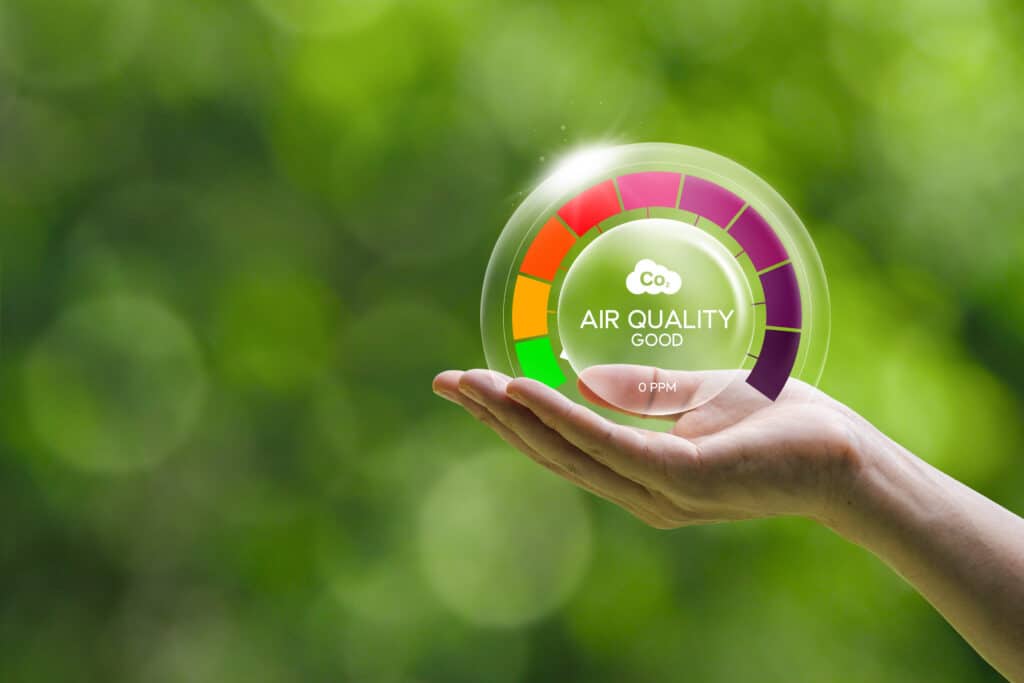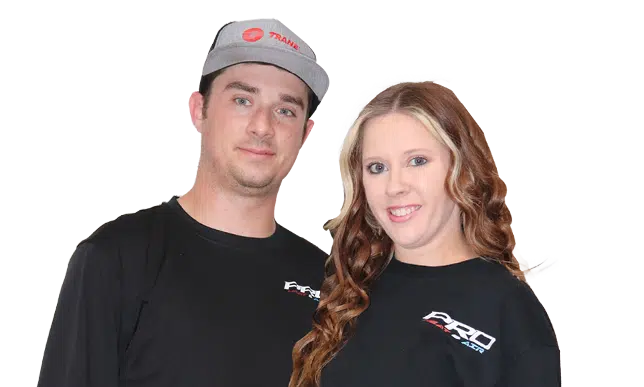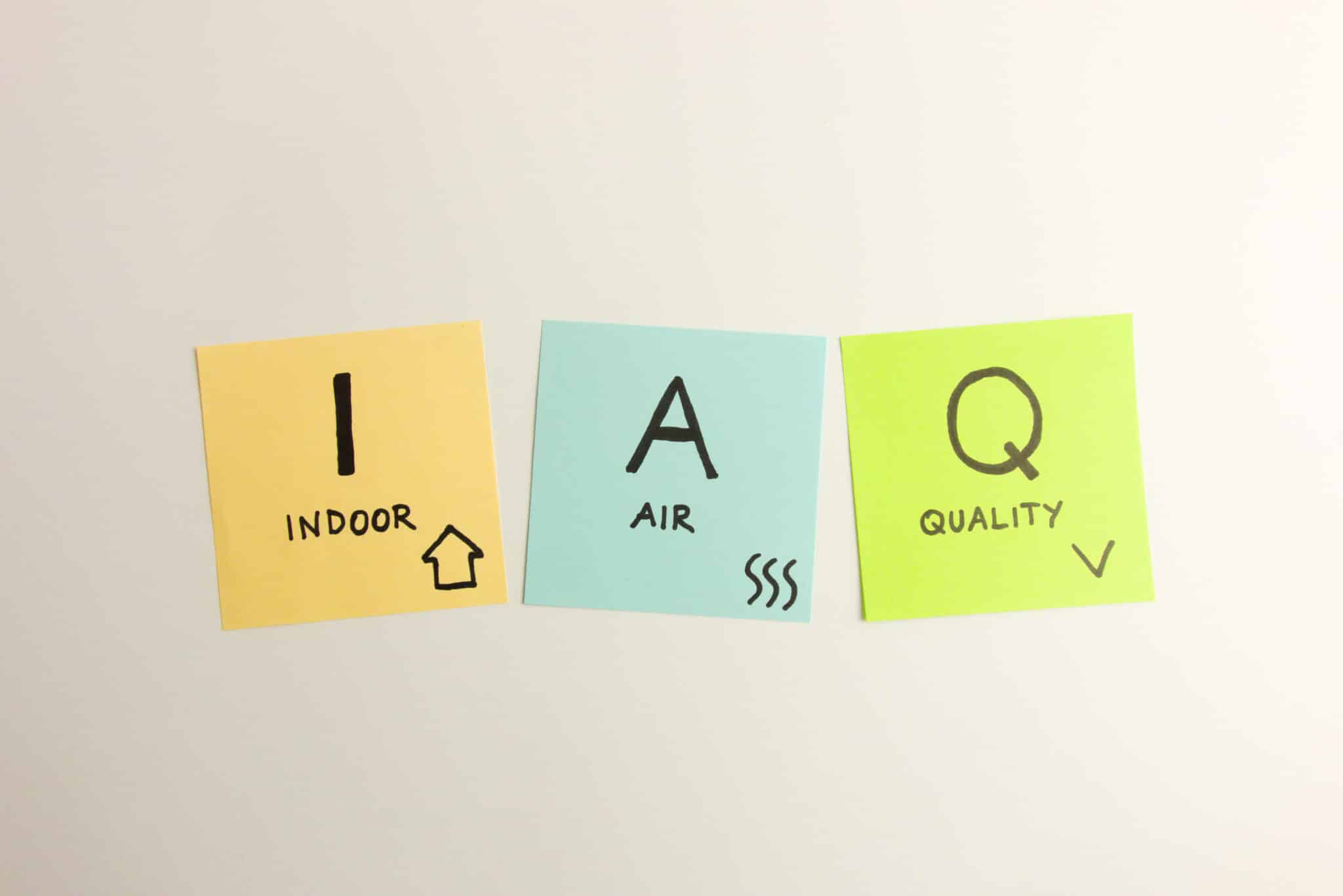Heating systems impact indoor air quality by spreading dust, allergens, and even harmful gases like carbon monoxide if not maintained. Bad filters and poor humidity control can also cause mold, making it harder to breathe. To keep indoor air clean, stay on top of HVAC maintenance, ensure good ventilation, and use high-quality air filters.
How Heating Systems Affect Indoor Air Quality
Your heating system does more than warm your home—it also impacts the air you breathe.
If it’s not well maintained, it can spread dust, pet dander, and other pollutants, making allergies and breathing issues worse.
Humidity is another big factor.
A poorly running system can make the air too dry or too damp.
Too much moisture leads to mold, which releases spores that can trigger asthma and allergies.
Too little moisture can cause dry skin, throat irritation, and sinus problems.
A more serious risk is carbon monoxide (CO), an invisible, odorless gas that can leak from faulty fuel-burning heaters.
Exposure to CO can cause dizziness, headaches, or even life-threatening health issues.
A good HVAC filter helps trap these pollutants, but it must be changed often to work well.
Without regular maintenance, your heating system could negatively impact the air in your home instead of improving it.
For homeowners in Reno, TX, scheduling routine HVAC checkups with Pro Heating and Air is the best way to maintain healthy indoor air quality all year.

Common Indoor Air Pollutants from Heating Systems
Your heating system helps circulate air in your home, but if not maintained, it can also spread pollutants.
The most common culprits are dust, pet dander, and allergens.
As air moves through vents and ducts, it picks up these particles and spreads them around, which can trigger allergies, congestion, and breathing issues.
Another common problem is mold and mildew, usually caused by too much moisture and poor airflow.
If your heating system doesn’t control humidity well, damp spots can form inside the ducts, creating the perfect place for mold to grow.
Once mold spores get into the air, they can make asthma and allergy symptoms worse.
The most dangerous risk is carbon monoxide (CO), a gas you can’t see or smell.
If a fuel-burning heating system isn’t vented properly, CO can leak into your home.
Breathing it in can cause nausea, dizziness, and, in serious cases, carbon monoxide poisoning, which can be deadly.
Regular furnace and heat exchanger checkups can help prevent this risk.
To improve indoor air quality, change HVAC filters, control humidity, and schedule regular maintenance.
Pro Heating and Air offers expert HVAC services in Reno, TX to help keep your home’s air fresh, clean, and safe.
The Role of HVAC Filters in Indoor Air Quality
HVAC filters help keep your home’s air clean.
They trap dust, pet hair, pollen, and tiny particles that would otherwise spread through your heating system.
Without a good filter, your system can spread allergens, making allergy and breathing problems worse.
Choosing the Right Filter for Your Home
Not all filters work the same way.
Filters with higher MERV ratings catch smaller particles, improving air quality.
But if the rating is too high, it can strain your system and lower efficiency.
HEPA filters offer top-level filtration but may need system adjustments to handle airflow.
Electrostatic filters use static electricity to attract particles and can be reused, making them an eco-friendly choice.
The best filter depends on your home’s ventilation needs.
How Often to Replace or Clean Your Filters
Changing filters on time is key.
Many should be replaced regularly, but homes with pets, smokers, or allergy sufferers may need more frequent changes.
A dirty filter makes your system work harder, raises energy use, and lowers air quality.
Checking filters often helps your system run better and keeps your air clean.
For expert help, Pro Heating and Air in Reno, TX, offers advice and maintenance to improve indoor air quality and keep your HVAC system in top shape.
Why Proper Ventilation Matters for Clean Air
Good ventilation is key to healthy Indoor Air Quality.
Without it, pollutants get trapped inside, affecting your health.
Stale air full of dust, pet dander, VOCs, and even carbon monoxide has nowhere to go, leading to allergies, breathing issues, and poor Indoor Air Quality.
How Bad Ventilation Traps Pollutants
When fresh air can’t get in, indoor pollutants build up.
Cooking fumes, chemical cleaners, and even gases from furniture stick around, making the air harder to breathe.
Heating systems can spread these pollutants if not kept clean.
Plus, too much humidity from poor airflow creates mold, making allergies and asthma worse, further diminishing Indoor Air Quality.
Easy Ways to Improve Ventilation
Keep your air fresh with these simple steps:
- Use Exhaust Fans – Run them in the kitchen and bathroom to remove moisture and pollutants.
- Open Windows When You Can – Even a little fresh air can help, even in cooler months.
- Try an ERV System – Energy recovery ventilators bring in fresh air without wasting energy.
- Get Regular HVAC Maintenance with Pro Heating and Air – A clean, well-working system boosts airflow and air circulation, improving Indoor Air Quality.
Good ventilation isn’t just about comfort—it helps you stay healthy.
Keep air moving, and you’ll breathe easier while enhancing Indoor Air Quality.
How Heating System Maintenance Impacts Indoor Air Quality
Keeping your heating system in good shape is key to clean indoor air.
When ignored, HVAC units collect dust, dirt, and even mold, which then spread through your home and lower indoor air quality.
Regular check-ups and cleaning stop these contaminants from building up and harming your health.
Dust and dirt are big problems in neglected systems.
Clogged filters and dirty ducts let allergens, pet dander, and dust mites move freely, making allergies and asthma worse.
Changing air filters regularly is one of the easiest and best ways to maintain fresh air in your home.
There’s more to worry about than just dust.
Carbon monoxide leaks can be dangerous too.
If heating systems that use gas, oil, or wood break down, they might release this deadly gas.
Without regular upkeep, leaks can go unnoticed, putting your health at risk.
Getting a professional inspection from Pro Heating and Air in Reno, TX, can catch these problems early and keep your home safe.
Routine cleaning also stops mold from growing inside the system.
Mold loves damp places, and if left unchecked, it can send harmful spores into the air.
Proper maintenance keeps humidity in check, helping you breathe easier.
Regular upkeep leads to cleaner air, better system performance, and a safer home.
How Humidity Affects Indoor Air Quality
Keeping the right humidity level is key to having clean, healthy air at home.
Too much humidity creates the perfect spot for mold and mildew to grow, spreading spores that can cause allergies and breathing problems.
Too little humidity makes the air too dry, which can irritate your throat, dry out your skin, and even damage wood furniture and floors.
How Humidifiers and Dehumidifiers Help
Your heating system affects humidity.
Furnaces dry out the air, which can make your home uncomfortable in winter.
A humidifier adds moisture, keeping the air comfortable and easy to breathe.
If your home has too much humidity, a dehumidifier removes extra moisture, helping stop mold and musty smells.
How Heating Systems Affect Moisture
A poorly maintained heating system can make humidity problems worse.
Leaky ducts or an inefficient furnace may cause uneven heating, leaving some areas too dry and others too damp.
Also, clogged HVAC filters block airflow, making it harder to control moisture.
Regular maintenance from experts like Pro Heating and Air in Reno, TX, helps keep humidity in balance for better indoor air quality.
Keeping the right moisture level isn’t just about comfort—it helps prevent health issues, property damage, and poor air conditions.
With the right HVAC care, you can breathe easier and keep your home healthy all year.
Signs Your Heating System Is Hurting Indoor Air Quality
A poorly maintained heating system can quietly ruin the air you breathe.
If you’ve been sneezing more or having trouble breathing, your system might be spreading dust, pet dander, and other irritants.
This happens when filters get clogged or the system isn’t ventilated properly.
Without regular maintenance, your HVAC can push these particles through your home, causing allergies, congestion, and worsened asthma symptoms.
Another clear sign is constant dust buildup or a stale, stuffy feeling in your home.
If you wipe surfaces only to see dust return fast, your HVAC might not be filtering the air well.
Poor airflow traps pollutants inside, making your living space feel uncomfortable and unclean.
Musty smells or mold growth could mean too much moisture in the air, caused by your heating system.
When warm air meets excess moisture, mold and mildew can grow, leading to allergies and breathing problems.
Regular checkups and keeping humidity levels in check can help prevent this.
If your home suddenly feels less comfortable, or you keep getting headaches and feeling tired, indoor air quality might be to blame.
Scheduling maintenance with Pro Heating and Air in Reno, TX can help keep your air clean and your home healthier.
Expert HVAC Solutions for Cleaner Indoor Air
Keeping your HVAC system in good shape is key to having fresh, breathable air at home.
At Pro Heating and Air, we provide expert HVAC services to improve indoor air quality and keep your heating system working efficiently.
Upgrade Your System for Better Air
Old heating systems can spread dust, allergens, and pollutants through your home.
Upgrading to a high-efficiency HVAC unit with better filters can cut down on these airborne particles.
New smart thermostats also help control humidity, preventing mold and excess moisture that can trigger breathing problems.
Advanced Air Purification and Filtration
Good air filters help remove allergens, pet dander, and dust.
HEPA and electrostatic filters trap tiny particles that regular filters miss.
If you want extra protection, UV air purifiers and whole-home filtration systems can reduce bacteria, viruses, and airborne chemicals (VOCs) that affect your health.
At Pro Heating and Air, we provide custom HVAC solutions for homeowners in Reno, TX.
Whether you need regular system maintenance or advanced filtration, we’ll help you breathe easier—one clean air cycle at a time.
Winter Heating and Air Quality: What You Need to Know
When it gets cold, homes in Reno, TX stay sealed to keep the heat in.
But with less fresh air, dust, pet dander, and other particles build-up, which can trigger allergies and breathing problems.
If you use a gas furnace or wood stove, you also need to watch out for carbon monoxide—a deadly gas with no color or smell that can be dangerous without proper airflow.
Dry winter air is another issue.
Heating systems pull moisture from the air, which can cause dry skin, stuffy noses, and static electricity.
But too much moisture from poor ventilation can lead to mold and mildew, making the air worse.
To improve indoor air quality during winter, try these steps:
- Use good-quality HVAC filters and change them often to cut down on dust and particles.
- Use a humidifier or dehumidifier as needed to balance moisture in the air.
- Schedule a heating system checkup with Pro Heating and Air to make sure everything runs safely and efficiently.
By following these tips, you can breathe easier and stay cozy while keeping your indoor air quality at its best all winter.
How to Improve Indoor Air Quality in Reno, TX
Reno, TX, has hot, humid summers and cool winters, making air purity a concern all year.
High humidity can lead to mold growth, while winter heating can spread dust and allergens.
Fixing these issues takes a clear plan.
Common Air Quality Issues in Reno
Humidity in Reno can lead to mold in homes, especially if airflow is poor.
In winter, poor ventilation or malfunctioning heating systems can be dangerous, especially if you use gas furnaces or fireplaces.
Dust and pet dander also build up quickly in sealed, heated homes, making allergies worse.
How HVAC Services Can Help
Better indoor air quality starts with regular HVAC care, like changing filters, cleaning ducts, and checking systems.
Pro Heating and Air provides custom air solutions for Reno’s climate.
Their team keeps heating systems safe, helping to maintain good air circulation and reduce dust buildup.
HEPA filters and UV light purifiers can also help cut down on allergens and other harmful particles.
To breathe cleaner air, schedule an inspection with Pro Heating and Air.
A well-kept HVAC system improves air quality, boosts comfort, saves energy, and helps long-term health.
How Energy Efficiency Affects Indoor Air Quality
Saving energy cuts utility bills, but it can also affect indoor air quality if not handled right.
When a home in Reno, TX is sealed tight to keep heat in, airflow drops, which can trap dust, allergens, and chemicals inside.
Without good ventilation, these pollutants build up, making the air stale or even unhealthy.
Sealing gaps and adding insulation can boost energy savings, but it’s just as important to allow fresh air in.
Systems like heat recovery ventilators (HRVs) or energy recovery ventilators (ERVs) help bring in fresh air without wasting energy.
They push out stale air and pull in filtered outdoor air, cutting down on pollutant buildup.
High-efficiency HVAC systems with strong filters can also improve the air inside by catching tiny particles.
But filters need regular cleaning or replacement to work well.
If clogged, they can make the heating system spread contaminants, making conditions worse.
To keep your home energy-efficient and air clean, work with experts like Pro Heating and Air to check your HVAC system and ventilation.
With proper upkeep and smart airflow control, you’ll enjoy a home that’s comfortable, efficient, and healthy.

FAQs
How does my heating system affect indoor air quality?
Your heating system moves air around your home. If it’s not well-kept, it can spread dust, allergens, and other pollutants. Clogged filters and dirty ducts can make air quality worse, leading to allergy flare-ups and breathing issues.
What are the signs of poor indoor air quality?
If you have more allergy symptoms, more dust, stuffy air, headaches, or feel tired for no reason, your air quality may be bad. Excess condensation on windows or musty smells can also be a sign that your heating system is making the problem worse.
How often should I replace my HVAC filters?
Most air filters should be changed every 1-3 months, depending on how much you use them and if you have pets or allergies. Some high-efficiency filters last longer but still need regular checks to keep air flowing well.
Can my heating system cause mold growth?
Yes, if humidity isn’t controlled, your heating system can create damp areas where mold grows. Poor ventilation and too much moisture in ducts can lead to mold spores in the air, which may trigger allergies and breathing issues.
How can I improve indoor air quality in my home?
Keeping up with HVAC maintenance, using quality air filters, having good ventilation, and adding an air purifier can help. If you’re in Reno, TX, Pro Heating and Air offers expert HVAC services to keep the air in your home clean and fresh.








